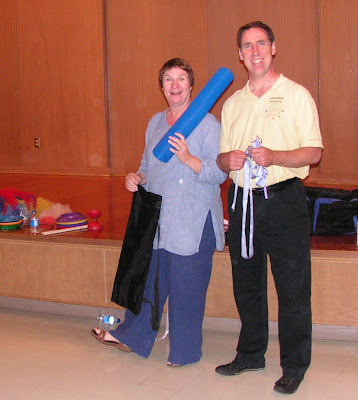Before Monday, I'll pull out my checkbook and write a couple of hefty checks for quarterly taxes. Those of you who work for others most likely have money taken out of your paycheck for taxes, but the self-employed have to shell out a percentage of our income four times a year. I'm not complaining: I know that my taxes pay for schools, arts organizations and libraries, where I do lots of work, and taxes pay for roads so I can get to those venues. I remind myself that if I'm paying taxes, it means that I made money. Still, in lean times, writing the checks can make me pause.
Often when I tell people what I do, they ask if I get paid for it. Yes, I do. I've been making my living as a storyteller since 1993, with a few temp jobs here and there in the early years. In those early years, I had trouble stating my fees. I'd stammer and stutter, and offer to work for less than what I needed.
In about 1995, I found a very helpful book, Earn what you deserve: how to stop underearning and start thriving, by Jerrold Mundis.
At that point, I still thought artists had to be starving and possibly living in a garret (I was in a one-bedroom apartment in a building that looked like a motel). I came to realize that this isn't true. The book helped me be a thriving artist, not a starving artist (I now own a house that suits me perfectly).
In reading Earn what you deserve, I came to understand why I had a poverty mindset and how to change it. One great benefit was that I learned to state my fees more confidently. I remembered, though I didn't say it out loud, that I pay my own health insurance, taxes, and overhead, that I've been a storyteller for many years and have a wealth of experience, and that my fees are reasonable. Okay, sometimes I said those things out loud, but I learned not to whine as I did so.
Does this mean I always charge for storytelling? No. I do pro bono or reduced-fee work if I have the time, believe in the cause and haven't hit my quarterly quota of this kind of gig. Sometimes I volunteer my services without being asked. I find that if I do this with a willing heart, the gig tends to go well. If I do it with any resentment, it often happens that I feel underappreciated and drained at the end. One of the biggest lessons I learned from the book is "resentment blocks flow." That's a useful lesson in any arena.

 She's not yet Twittering, thank goodness, but she now has her own Facebook fan page (and it turns out you don't even have to sign up for Facebook to see it). Where will this end?!
She's not yet Twittering, thank goodness, but she now has her own Facebook fan page (and it turns out you don't even have to sign up for Facebook to see it). Where will this end?!









